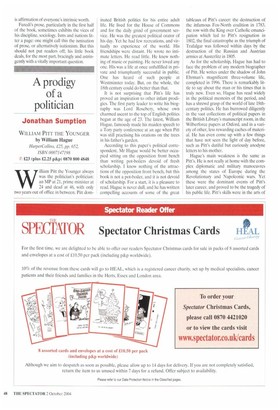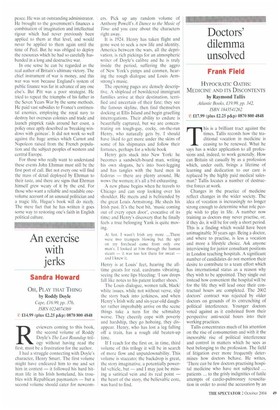A prodigy of a politician
Jonathan Sumption
WILLIAM PITT THE YOUNGER by William Hague HatperCollins, £25, pp. 652, ISBN 0007147198 [V £23 (plus £2.25 p&p) 0870 800 4848 William Pitt the Younger always was the politician's politician: an MP at 21, prime minister at 24 and dead at 46, with only two years out of office in between. Pitt dom
Mated British politics for his entire adult life. He lived for the House of Commons and for the daily grind of government service. He was the greatest political orator of his day. Yet he had few recreations, and virtually no experience of the world. His friendships were distant. He wrote no intimate letters. He read little. He knew nothing of music or painting. He never loved any one. His was a life at once unfulfilled in private and triumphantly successful in public. One has heard of such people at Westminster today. But, on the whole, the 18th century could do better than that.
It is not surprising that Pitt's life has proved an inspiration to other infant prodigies. The first party leader to write his biography was Lord Rosebery, whose own charmed ascent to the top of English politics began at the age of 23. The latest, William Hague, famously made his maiden speech to a Tory party conference at an age when Pitt was still practising his orations on the trees in his father's garden.
According to this paper's political correspondent, Mr Hague would be better occupied sitting on the opposition front bench than writing pot-boilers devoid of fresh scholarship. I know nothing of the attractions of the opposition front bench, but this book is not a pot-boiler, and it is not devoid of scholarship. For a start, it is a pleasure to read. Hague is never dull, and he has written compelling accounts of some of the great tableaux of Pitt's career: the destruction of the infamous Fox-North coalition in 1783, the row with the King over Catholic emancipation which led to Pitt's resignation in 1802, the final catastrophe as the triumph of Trafalgar was followed within days by the destruction of the Russian and Austrian armies at Austerlitz in 1805.
As for the scholarship, Hague has had to face the problem of any modern biographer of Pitt. He writes under the shadow of John Ehrman's magnificent three-volume life, completed in 1996. There is remarkably little to say about the man or his times that is truly new. Even so, Hague has read widely in the political memoirs of the period, and has a shrewd grasp of the world of late 18thcentury politics. He has burrowed diligently in the vast collections of political papers in the British Library's manuscript room, in the Wilberforce papers at Oxford, and in a variety of other, less rewarding caches of material. He has even come up with a few things that have not seen the light of day before, such as Pitt's dutiful but curiously anodyne letters to his mother.
Hague's main weakness is the same as Pitt's. He is not really at home with the complex diplomatic and military manoeuvres among the states of Europe during the Revolutionary and Napoleonic wars. Yet these were the dominant events of Pitt's later career, and proved to be the tragedy of his public life. Pitt's skills were in the arts of peace. He was an outstanding administrator. He brought to the government's finances a combination of imagination and intellectual rigour which had never previously been applied to them at that level, and would never be applied to them again until the time of Peel. But he was obliged to deploy the resources which he had so carefully husbanded in a long and destructive war.
In one sense he can be regarded as the real author of Britain's ultimate victory. The chief instrument of war is money, and this war was won because England's system of public finance was far in advance of any one else's. But Pitt was a poor strategist. He tried to repeat the triumphs of his father in the Seven Years War by the same methods. He paid vast subsidies to France's continental enemies, employing the royal navy to destroy her overseas colonies and trade and launch pinprick raids around her coast, a policy once aptly described as 'breaking windows with guineas'. It did not work so well against the huge armies which Carnot and Napoleon raised from the French population and the subject peoples of western and central Europe.
For those who really want to understand these events John Ehrman must still be the first port of call. But not every one will find the mass of detail deployed by Ehrman to their taste, and there are signs that Ehrman himself grew weary of it by the end. For those who want a reliable and readable onevolume account of an unusual politician and a tragic life, Hague's book will do nicely. The mere fact that he has written it goes some way to restoring one's faith in English political culture.



















































































 Previous page
Previous page